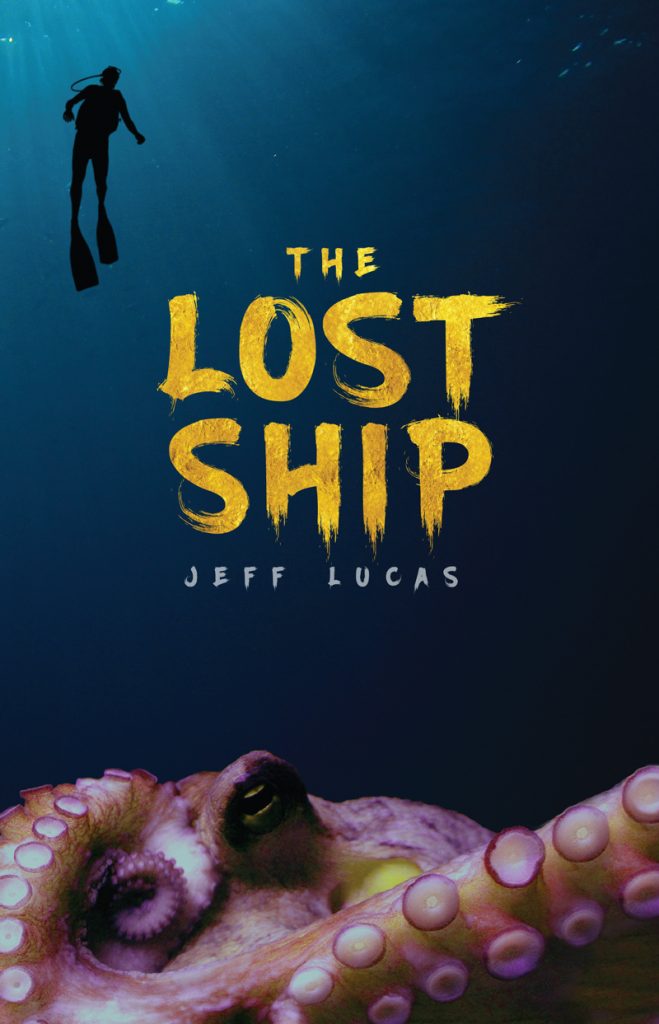Interview with Jeff Lucas, Author of The Lost Ship
Welcome, Jeff! We’re so thrilled to have you at Smack Dab. Give us the elevator pitch for The Lost Ship.
Twelve-year-old Jack's father is a professional diver working on a way to talk underwater. When he loses one of the devices overboard, an octopus slips away with it and learns to talk. Jack ventures out to shoot a photo of the octopus for a school assignment and is flummoxed to find the octopus can talk. He buys in and the two head off across the reef to find what Jack imagines to be “the greatest maritime discovery in history.”
What was the inspiration? Where’d the idea come from?
I skin- and scuba-dived in Hawaii as a twelve-year-old, where I accompanied natives spear-fishing for dinner. I encountered octopuses on those dives (I hesitate to recount the particulars but the octopuses ended up on the table). I later found out how smart they are and thought it would be fun to center a story around an octopus. Redemption? Possible.
I love the friendship described between Jack and an octopus. In a way, I felt like it was a metaphor for wanting kids to befriend the natural world. Is that going too far—or part of what you wanted to convey?
Jack and Armstrong were buds but I hadn't thought of "friendship" in regard to kid lit. A general friendship between Jack and, let's say, a stone fish, would have ended with a bad outcome. Those who've been exposed to stone fish venom have to be prevented from cutting off their fingers to lessen the pain.)
You do a little creative smooshing of geographical areas. Why was it important to you to get these elements in?
Your "smooshing of geographical areas" was a good catch. I wanted as much interaction with the creatures and environments as possible so, after much thought, I decided to include a temperate area with kelp, into which divers get tangled and drown. The episode was too good to pass up. You might note the temperate area is consistent in its creatures: blacksmiths, opaleyes, and wolf eels live within the kelp. The wolf eel, with its ugly/cute face, might have been enough for me to include temperate seas. I should add, despite their looks, wolves are curious and friendly.
What was your writing process like?
As for my writing process, my knee jerk answer is: "it was a blast." I laughed the whole way through. That said, there was lots of research to be done, although I didn't mind because I was finding fun stuff to use. If I found a good name, for example, "Venus's flower basket," I wanted to get it in some way--even though neither Jack nor Armstrong would interact with it. Once I had all the stuff to include, it had to be ordered so that transitions were seamless. This took me four years of arranging. I noticed you're an "outliner." I had a detailed--fish-by-fish--outline before I started writing. Once I got to each episode, I discovered what I was going to say. So much fun!
What was the publication process like? Biggest surprises?
Regarding publication, I found out that one can't just "press a button" and expect the book to be available. My book designer, Kari Fera, disabused me of that. I loathe messing with the computer so I had lots of help getting the book to market. It was a huge benefit to find Mr. Ratner and Ms. Stein.
I love the octopus facts you include on your site. What sparked your interest in this creature?
I have great affection for octopuses, which possess a large number of neurons (they're in the top ten) and must survive on their wits. They have neither offensive nor defensive weapons; they're obligated to be tricky. What's not to like? Did you check out "blue coral," in the "creatures library?" Or, "kelp?" Or, the "stinker sponge?" These photos--better than words-- demonstrate how good they are.
What’s one thing you hope kids take away from this read?
Mr. Ratner used the word "mission," which I like. I've said (and believe) that the current kids will save the oceans; my idea has been to interest them, via demonstrating how many extraordinary things there are in the sea.
What’s one piece of advice you’d give would-be writers?
As for my advice to writers: "read widely and look up every word you don't know." I've found that words I've read but never heard in conversation, sometimes pop out of my mouth. Then, when my interlocutor asks me what they mean, I confess I have no idea (just kidding).
And now, the giveaway:
Five—yes! Five!—copies are available to our followers. Winners will be chosen at random. Use the form below or email directly to smackdab (dot) middle (at) yahoo.com.

This sounds like a winner. Can't wait to read it...
ReplyDeleteThis book is exactly the kind I love to read, review, and share with the kids in my life.
ReplyDelete